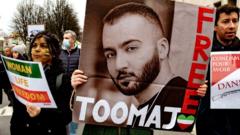Toomaj Salehi, an Iranian rapper sentenced to death for expressing support for anti-government protests, has been released from prison after two years. His release comes after his death sentence—initially imposed for inciting unrest following the death of Mahsa Amini while in police custody—was overturned in June.
Salehi, 34, was arrested in October 2022 amid nationwide protests ignited by Amini's death. Following his conviction in July 2023, Salehi received a prison sentence of six years and three months but managed to avoid a death sentence due to a Supreme Court ruling. He had previously been banned from performing live prior to his arrest due to his critical lyrics directed at the Iranian government.
Authorities charged Salehi with multiple offenses, including spreading misinformation online and public disorder, reflecting the broader crackdown on dissent within the country. His initial death sentence, set in April 2024 for "corruption on earth," raised alarm among human rights organizations, leading to widespread advocacy for his release.
His imprisonment occurred during a period of intense governmental scrutiny of protestors, triggered by Amini's death—a tragic event that spurred protests leading to hundreds of deaths and thousands of arrests. The Index on Censorship, a prominent campaign group advocating for Salehi’s freedom, praised his release and contended that he should never have faced imprisonment in the first place. This development continues to underscore the delicate and often dangerous landscape for free speech and artistic expression in Iran, amid rising tensions and state repression.




















